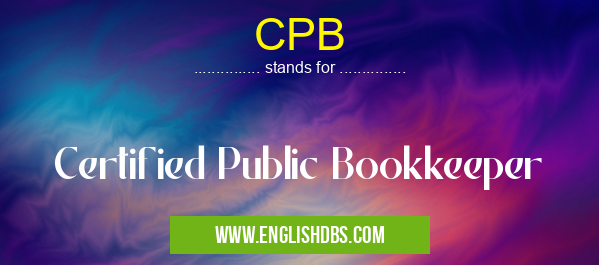What does CPB mean in CERTIFICATIONS & DIPLOMAS
CPB stands for Certified Public Bookkeeper. It is a certification that is awarded to individuals who have demonstrated their knowledge and skills in bookkeeping. CPBs are responsible for maintaining financial records, preparing financial statements, and performing other accounting tasks.

CPB meaning in Certifications & Diplomas in Business
CPB mostly used in an acronym Certifications & Diplomas in Category Business that means Certified Public Bookkeeper
Shorthand: CPB,
Full Form: Certified Public Bookkeeper
For more information of "Certified Public Bookkeeper", see the section below.
What Does CPB Mean?
Individuals who hold a CPB certification have met certain requirements, including:
- Education: CPBs must have completed a recognized bookkeeping program or have equivalent work experience.
- Examination: CPBs must pass a comprehensive examination that covers a wide range of bookkeeping topics.
- Experience: CPBs must have a minimum amount of work experience in bookkeeping.
Why CPB Certification Matters
CPB certification is important for several reasons:
- Credibility: CPB certification demonstrates that an individual has the knowledge and skills required to perform bookkeeping tasks accurately and professionally.
- Career Advancement: CPB certification can help individuals advance their careers in accounting, finance, or other related fields.
- Compliance: CPBs are required by law in some jurisdictions to perform certain bookkeeping tasks.
Essential Questions and Answers on Certified Public Bookkeeper in "BUSINESS»CERTIFICATES"
What is a Certified Public Bookkeeper (CPB)?
A CPB is a professional who has demonstrated proficiency in the field of bookkeeping through certification. They are responsible for maintaining financial records, preparing financial reports, and assisting with tax preparation.
What are the requirements to become a CPB?
Typically, individuals must have a high school diploma or equivalent and pass an accredited certification exam. Some states may have additional licensing requirements.
What are the benefits of becoming a CPB?
CPBs gain credibility and recognition in the field, demonstrate their competence to potential employers, and enhance their career opportunities.
What are the responsibilities of a CPB?
Responsibilities may include: maintaining general ledgers, recording transactions, preparing financial statements, reconciling accounts, and assisting with audits.
Are CPBs required to have a bachelor's degree?
No, a bachelor's degree is not typically required to become a CPB. However, some employers may prefer candidates with a degree in accounting or a related field.
What is the difference between a CPB and a CPA?
CPAs are certified public accountants who have met additional education, experience, and licensing requirements. CPAs are authorized to perform audits, provide tax advice, and offer other accounting services.
Final Words: CPB certification is a valuable credential for individuals who want to pursue a career in bookkeeping. It demonstrates an individual's knowledge, skills, and commitment to the profession. CPB certification can lead to career advancement, increased credibility, and compliance with legal requirements.
CPB also stands for: |
|
| All stands for CPB |
